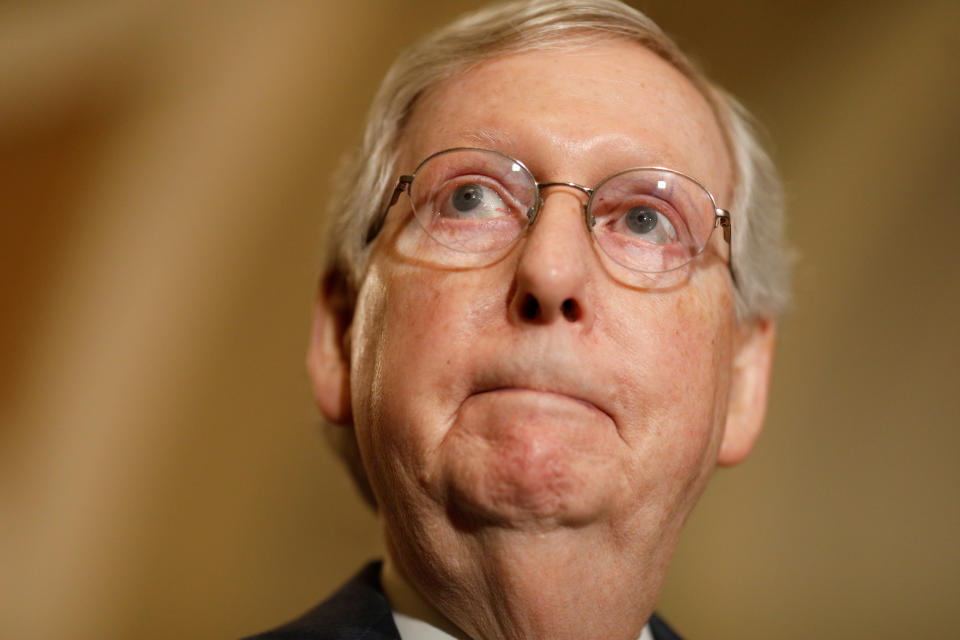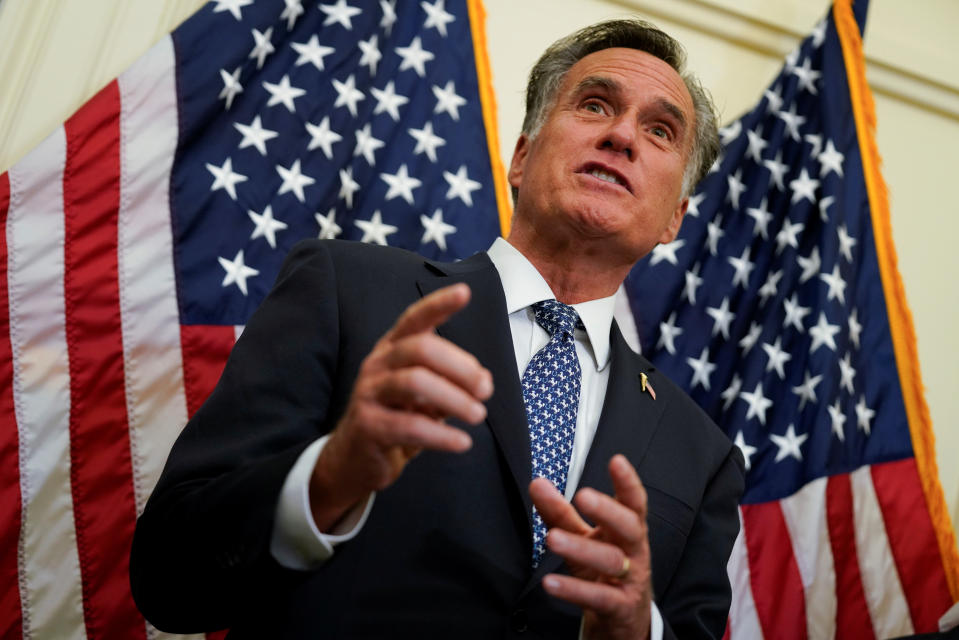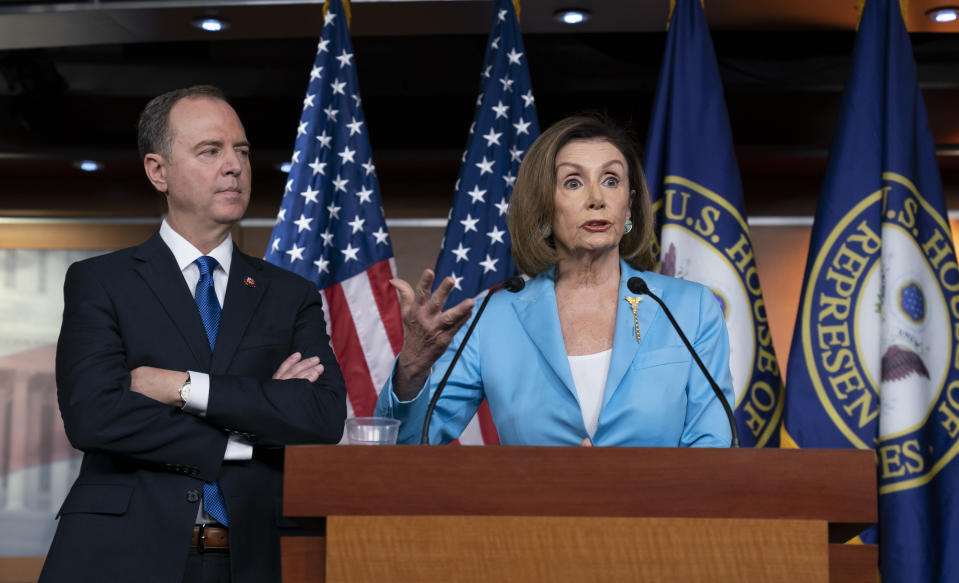'He's not completely settled': As impeachment moves forward, McConnell is mostly quiet
When Antonin Scalia died in 2016, many politicians weren’t sure how to react to a Supreme Court vacancy in an election year.
Not Mitch McConnell. The Republican Senate Majority Leader waited about an hour after Scalia’s death to say he would block then-President Barack Obama’s nominee, and Senate Republicans united behind him.
Now, however, the Senate leader from Kentucky is playing his cards closer to the vest in the early days of the Trump impeachment saga.
He has made one statement describing the impeachment effort as “laughable” but has otherwise said little publicly. He has certainly not given any clear marching orders to fellow Republicans like he did after Scalia’s sudden death.
McConnell does not want to take the lead on messaging or strategy at a time when President Trump and the White House do not have a clear plan, and because there are too many unknowns outstanding.
“He’s not completely settled yet on where he’s headed,” an operative with deep and long-running ties to congressional Republicans told Yahoo News. “The scary part here is you have to build strategy on assumptions of what outside actors are going to do.
“You want your foundation built on things you can control,” the GOP operative said.

McConnell does not control Trump’s reactions and public statements, which have been increasingly erratic. The president has accused Democratic leaders of “treason,” publicly invited multiple foreign governments to dig up dirt on Democrats running for president, and berated reporters for daring to ask him basic questions.
It’s also too early for McConnell to know how much more will come out of the House investigation of Trump’s efforts to pressure the Ukrainian president to look into former Vice President Joe Biden and his son Hunter Biden. There were new revelations every day this past week, including the release of explosive text messages by former U.S. special envoy to Ukraine Kurt Volker between the top U.S. diplomat in Ukraine, Bill Taylor, and U.S. Ambassador to the European Union Gordon Sondland.
“I think it’s crazy to withhold security assistance [to Ukraine] for help with a political campaign,” Taylor said. Sondland wrote back that Trump had been “crystal clear” that there would be “no quid pro quo’s of any kind,” and then suggested the group stop communicating over text message.
As of today, Republicans are not breaking with the president. Yet neither are they defending him.
“Any notion that there will be an exodus from Trump on this in the Senate is a fairy tale,” said Curt Anderson, a Republican campaign consultant who is involved in the campaigns of two Republican senators in competitive elections: Colorado’s Cory Gardner and North Carolina’s Thom Tillis.
But there are two groups of Republican senators who bear close watching. One is the handful of GOP senators who are facing tough reelection campaigns over the next year in states that are becoming less Republican, and will be under a microscope. This group includes Gardner, Tillis, Sen. Martha McSally of Arizona and Sen. Susan Collins of Maine.
The second is a small group of senators who are least aligned with Trump and in some cases openly antagonistic toward him. This is a more nebulous category. Certainly Utah Sen. Mitt Romney — the 2012 Republican nominee who openly opposed Trump’s nomination in 2016 — is the most prominent member of that group.

There are other Republican senators who have opposed Trump in the past too but have been more deferential of late, such as Ben Sasse of Nebraska, Mike Lee of Utah and Marco Rubio of Florida.
And then there are a few Republican senators who are known for their independent streaks, who often don’t see eye to eye with Trump but generally keep quiet about it, such as Todd Young of Indiana, Rob Portman of Ohio, Pat Toomey of Pennsylvania and Tim Scott of South Carolina.
Either of these groups, or some combination of the two, could ignite a rebellion if things continue to go downhill for Trump.
The task for McConnell will likely be to keep a united front, because if one or two Republican senators were to turn against the president, that could produce a cascade effect.
In several conversations with people who are close observers of McConnell, one thing that everyone repeated is that the Republican leader will do whatever is best for his members, and for the Republican majority.
McConnell would be happy to let some of his vulnerable incumbents break with the party on a tough issue in many cases, to help them secure reelection. But impeachment is likely to be a different scenario.
“Usually you give a pass, but on this it’s hard to do that,” said the Republican operative, who added that could have the effect of breaking a dam.
One Democrat involved in the impeachment process said that the next two weeks will be crucial to seeing where the case for impeachment is headed. Democrats are likely to keep their investigation narrowly focused for now on the Ukraine matter, with the hopes of sending articles of impeachment to the full House by Thanksgiving, this person said.

That would set up a vote in the full House sometime in December. House Democratic leadership aides did not commit to that timeline, however.
McConnell has said that he does not have a choice about whether to bring any articles of impeachment to the floor of the Senate.
“I would have no choice but to take it up. How long you are on it is a different matter, but I would have no choice but to take it up based on a Senate rule on impeachment,” he said on CNBC. Republican leadership aides have reiterated this point.
The big question, as McConnell implied in his comments to CNBC, is what he would do after the articles are introduced. Would he immediately bring up a motion to dismiss the articles? He might if he thought he had enough votes to pass it.
A Republican Senate leadership aide indicated in an email to reporters that McConnell would move quickly, forwarding a 1986 memo from the Senate parliamentarian, an appointed position that helps the legislative body interpret the rules, that said that “the rules and the precedents on impeachment argue for a rapid disposition of any impeachment trial in the United States Senate.”
The GOP leadership aide also noted that a motion to dismiss the articles would be allowed under Senate impeachment rules, and pointed to a vote on a motion to dismiss the articles in the Senate during the Clinton impeachment trial as an example. That vote, however, took place nearly three weeks after the trial had begun.
Democrats argue it would be unprecedented to prevent a Senate trial. “The same Mitch McConnell who blocked the Senate’s exercise of its authority to advise and consent to the Supreme Court nomination of [Obama nominee] Merrick Garland, could attempt to prevent the trial of a House impeachment of Donald Trump,” wrote Bob Bauer, a Democratic attorney who represented President Bill Clinton during his 1998 impeachment by the Republican-controlled House, which failed to garner supermajority support in the Democrat-controlled Senate.
In Clinton’s case, the Senate held a monthlong trial, with Supreme Court Chief Justice William Rehnquist presiding, as prescribed by Senate rules.
A Senate trial could become unavoidable for McConnell.

“The evidence for [Trump’s] removal from office could turn out to be so overwhelming that it would be politically untenable for McConnell to adopt this course or impossible for him to hold his caucus in line. These outcomes are particularly likely if public opinion at the time swings decisively against the president,” Bauer wrote.
There may be a critical mass of Republicans who want to see the Senate hold an impeachment trial, where they hear from witnesses, hear arguments from both sides and ask questions.
It would take 67 votes to impeach the president, so if all 46 Democrats and the one independent senator, Angus King of Maine, voted in favor, it would still require 20 Republican votes to meet that threshold.
That kind of abandonment of the president would require dramatic revelations and plot twists over the next few months, not because Trump is well liked by most Republican senators. He is not, and anyone who knows the Senate GOP conference will say so quite bluntly in private conversations.
But Trump remains popular with Republican voters, and most senators are not interested in a kamikaze mission.
One other variable is how the Democratic presidential primary shapes the process. The Senate could be in the middle of an impeachment trial in January, just weeks before the first votes are cast in the Feb. 3 Iowa caucuses.
That would be a spectacle: an impeachment trial or even a vote in the Senate where six of its Democratic members are — as of today — running for president, with the possibility of Joe Biden being called as a witness.
It’s the kind of eye-popping political drama that has McConnell taking his time to sort through the various potential trapdoors, dead ends and unforeseen consequences.
_____
Download the Yahoo News app to customize your experience.
Read more from Yahoo News:



